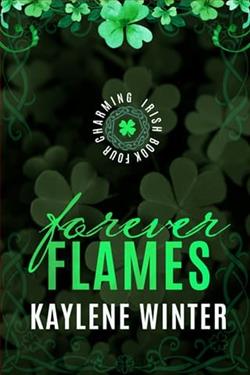Page 7 of The Future Is Blue
“What have you got in the way of savory, tonight, Giacama? I’m in the mood for salt.”
Giacama pushed aside the little window on an empty compartment of the automat. Her mild seabird eyes floated in the glass as though they were the night special.
“Good evening, Detective. I’ve got a lovely rind of cheese from the gluttons’ farms. It’s all yours.”
“Detective Inspector soon,” Belacqua said with a flush of pride. He took his crescent of cheese from the window. Only then did he see the young girl staring up at him through the blinders of her falcon-hood, rubbing anxiously at the backs of her hands.
“Are you a demon?” she whispered. “Are you an angel?”
“Naw,” Belacqua answered around a mouthful of white cheese. “I work for a living.”
The child might have said more, but a commotion disturbed the evening throngs. A strapping man with a raven’s grand face strode toward Detective Belacqua, out of breath, trembling in his black finery. Sergeant Tomek—but in all the aeons of known existence Belacqua had only known his sergeant to be a calm and rather cold sort.
Sergeant Tomek clasped his hand roughly, his raven’s face handsome and dark and puffed with excitement or terror. His black ruff bristled.
“Sir, I hate to trouble you at this hour and I know you hate to be interrupted when you’re…working…but something terrible’s happened. Something dreadful. You must come.”
Detective Belacqua tightened his long grey scarf and smoothed back his own rumpled feathers.
“Calm down, Tomek. You’ll spook the poor creatures. Just present the facts of the case and we’ll see to it with a quickness. What can possibly have you in such a state?”
Sergeant Tomek stared at the wine-dark flagstone floor. He swallowed several times before whispering wretchedly:
“A body, Sir.”
“Well, that’s hardly cause for all this upset, Sergeant. We’re nothing but bodies round here. Bodies, bodies everywhere, and hardly one can think. Go home and get some sleep, man, we’ll see to it in the morning.”
The raven-headed sergeant sighed and tried again, more miserably and more quietly than before.
“A dead body, Sir. A corpse.”
Detective Belacqua blinked. “Don’t be stupid, Tomek.”
“Sir. I know how it sounds.” Tomek glanced around at the passing folk, but most gave the policemen a wide berth. “But there is a dead woman lying face down with her throat cut and there’s blood everywhere and things on her back and she is very, very dead.”
Detective Belacqua grimaced with embarrassment. “Sergeant Tomek,” he hissed, “they can’t die. It’s not possible. They steal, they cheat, they vandalize, they fornicate, they lie, they curse God, but they do not kill and they do not die. That’s not how it works. That’s the whole point.”
But the raven would only say: “Come see.”
Detective Belacqua thought of his novel and his dry red wine waiting safe and warm for him in the watchtower. They called to him. But he knew what duty was, even if he did not know how to begin his opus. “Where is she?”
Sergeant Tomek trilled unhappily. He ran his hand along the black blade of his beak.
“Outside.”
Fifth Terrace: The Covetous
Pietta follows the man with the unusual nose. They have exchanged names. His is Savonarola. He spits the syllables of himself as though he hates their taste. He leads her through a door marked CONTEMPTUS MUNDI.
“My home,” he sighs, “such as it is.”
“I live in Taedium,” Pietta answers, and it is such a relief that she has remembered it, that the information was there when she reached for it, solid, heavy, cold to the touch. She almost stumbles with the sweetness of it. Savonarola grunts in sympathy.
“Too bad for you. You’ll find no fraternity among your neighbors, then. They keep to themselves in Taedium. They do not come to cloister, they do not trade, they do not attend the rainstorms. They don’t even take Christmas with the rest of us. But perhaps that’s to your taste. Taedium, Taedium, so close to Te Deum, you know. What passes for cleverness around here.”
Pietta remembers the feeling of longing for something lost before she ever had it. “I have made friends with a man on the mountain. He moves his arms. I move mine. We are up to the letter G. But there is no G in my name, so he cannot know me. I am…I am lonely. I thought someone would come for me.”
“No one on the mountain is your friend, girl,” snaps Savonarola, and they emerge into a wide piazza full of long tables with thick legs and glass lanterns the size of parish churches shining out into the mist of the night. Wind pulls at them like a beggar pleading. The tables are full of handkerchiefs unknotted, their contents laid out lovingly, more men and women in charcoal-blue rags closely guarding each little clutch of junk.















